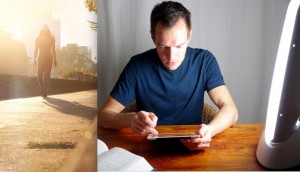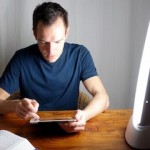
Sleep deprived? Can’t fall asleep fast? Do you wake up in the middle of the night and can’t fall back to sleep? Exposing yourself to natural light and avoiding artificial light (blue light) at the right times can help reset you circadian rhythm so you can sleep better.
For the vast majority of our history as humans we were in sync with the natural rhythms of day and night without exposure to artificial or blue light. Being in sync with the natural rhythms of day and night is one of the strongest influencers on our ability to sleep well. Our genes were shaped by this natural cycle of being exposed to natural light and darkness in a 24 hour period. This is one aspect of our environment that keeps our circadian rhythm or “body clock” in check and helps to keep us healthy.
Our hunter and gatherer ancestors weren’t working indoors all day, they didn’t work night shifts, nor did they expose themselves to blue light from computers, TV, and mobile devices. When you are exposed to too much artificial light when it’s nighttime and not enough natural light when it is daytime, your circadian rhythm or “body clock” will shift. This shift has profound impacts on your sleep and pretty much every function of your mind and body. (1, 2, 3, 4, 5)
Consequences of circadian rhythm disruption and sleep deprivation
- Immune System Dysfunction. Your immune system won’t work as well. This means you won’t heal as well and you are more likely to get sick. (6, 7)
- Decreased stress tolerance. You won’t be able to manage your stress as well. Your ability to guide yourself through difficult times is poor and things that normally wouldn’t bug you much start to bug you a lot. (8, 9)
- Decreased cognition. You won’t be able to think, learn, and solve problems as well. You won’t be able to articulate and communicate your ideas as well. (10)
- Increased memory loss. You may start to suffer from short or long-term memory loss. (10)
- Mood disorders. You are more prone to be depressed, anxious, moody, and fatigued. (11, 6, 12)
- Decreased concentration. Your ability to focus and hold your attention over long periods of time will decline. (10)
- Sleep apnea. You are more prone to develop sleep apnea. (13, 14)
- Hypothalamic-Pituitary-Adrenal Axis Dysfunction or HPA-D. Your cortisol (stress hormone) levels will increase. An increase in cortisol levels over a long period of time will lead to Hypothalamic-Pituitary-Adrenal Axis Dysfunction or HPA-D. HPA-D refers to a group of signs and symptoms including fatigue, sleep disruption, poor exercise tolerance and recovery, low libido, brain fog, weakened immune function, and reduced stress tolerance. (15, 16, 12, 17)
- Cardio-metabolic consequences. You would have an increased likelihood of metabolic syndrome (increased blood pressure, high blood sugar, excess body fat around the waist, and abnormal cholesterol or triglyceride levels), obesity, and heart disease. (18, 19)
- Increase in inflammation. You are more prone to develop inflammation (swelling) throughout the body. Inflammation is a precursor to most chronic illnesses. (21, 12, 17, 22)
- Mortality. Not getting enough sleep reduces your lifespan. (23)
How to reset your circadian rhythm in our modern world
Again, when you expose yourself to too much artificial or blue light at night time and don’t expose yourself to natural daylight in the morning, your circadian rhythm will shift which will affect your sleep. So wouldn’t it make sense to get more natural light somehow in the morning and expose yourself to less artificial and blue light in the evening?
Expose yourself to natural light in the morning
Getting outside in the morning for 30 minutes or more can help reset your circadian rhythm or “body clock”. Your circadian rhythm tells your body when to sleep, wake up, and eat. Two of the most important environmental factors affecting circadian rhythm is light entering the eye and body temperature. So getting plenty of natural bright light from outside lets the body know it’s daylight. (28) Ordinary indoor light is not strong enough to have a big impact on your circadian rhythm. It only measures 10 to 300 lux compared to outdoor light which measures 10,000 to 30,000 lux. (29)
So what do you do if you live in the Northern hemisphere like me where it is it dark outside early in the morning during the fall and winter months? You can still try to get outside by lunchtime or another option is to buy a light therapy machine. Buy a light machine that emits 10,000 lux of light and sit in front of it for fifteen to thirty minutes after waking up. These machines have been studied extensively for seasonal affective disorder (SAD) and depression. (30, 31) Research suggests they can also be effective for resetting your circadian rhythm as well. (32, 33) Sphere Gadget Technologies makes a good light machine I would recommend.
Restrict artificial light at night
Restricting artificial light at night means limiting or not using devices that emit blue light. This includes computers, mobile devices, and watching TV. The blue light from these devices enters the eyes and decreases melatonin. (24, 25, 26) Melatonin is the main hormone in your body that helps you sleep.
There are a few ways to reduce the effect of artificial light at night. You can stop using devices that emit blue light 2-3 hours before you go to bed. If you feel this is ‘impossible’ to do, you can change the display on your computers and mobile devices to decrease the amount of blue light they emit. Mobile devices often have settings for this built into them and you can install a program like f.lux. The best option is to buy amber tint safety glasses that you can start wearing at night. These glasses have been shown to be very effective at blocking out blue light, preventing melatonin suppression, and improving sleep quality and mood. (27) Uvex and Solar Shield brands are good options.


Leave a Reply